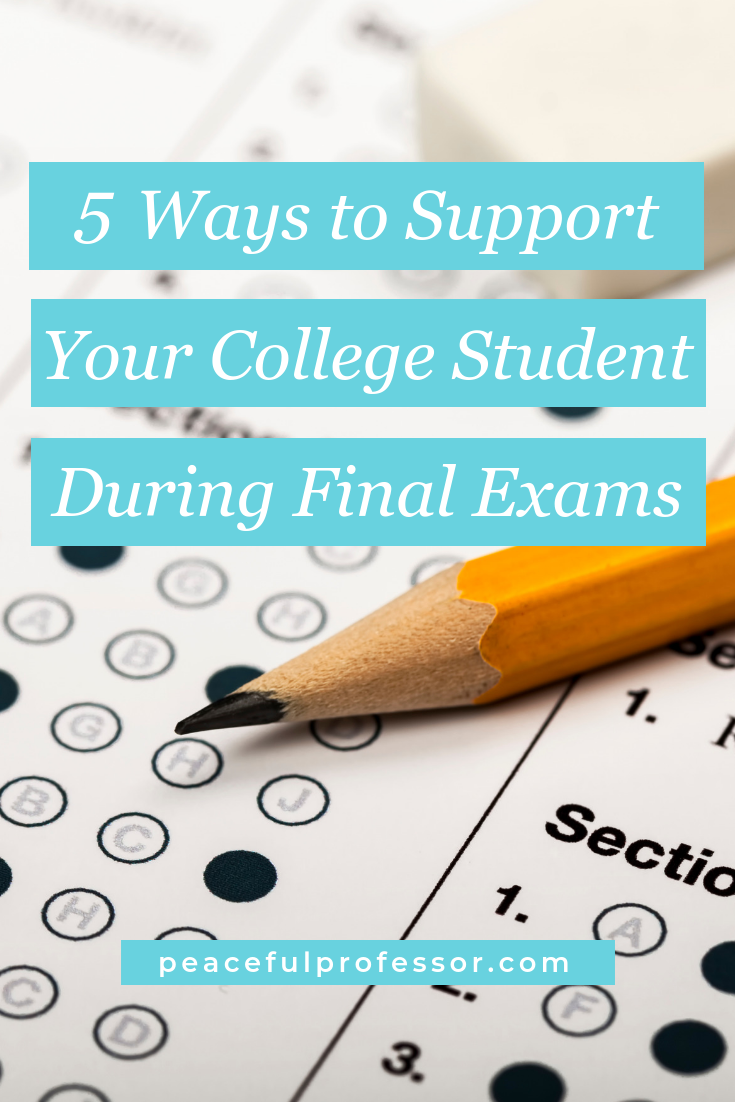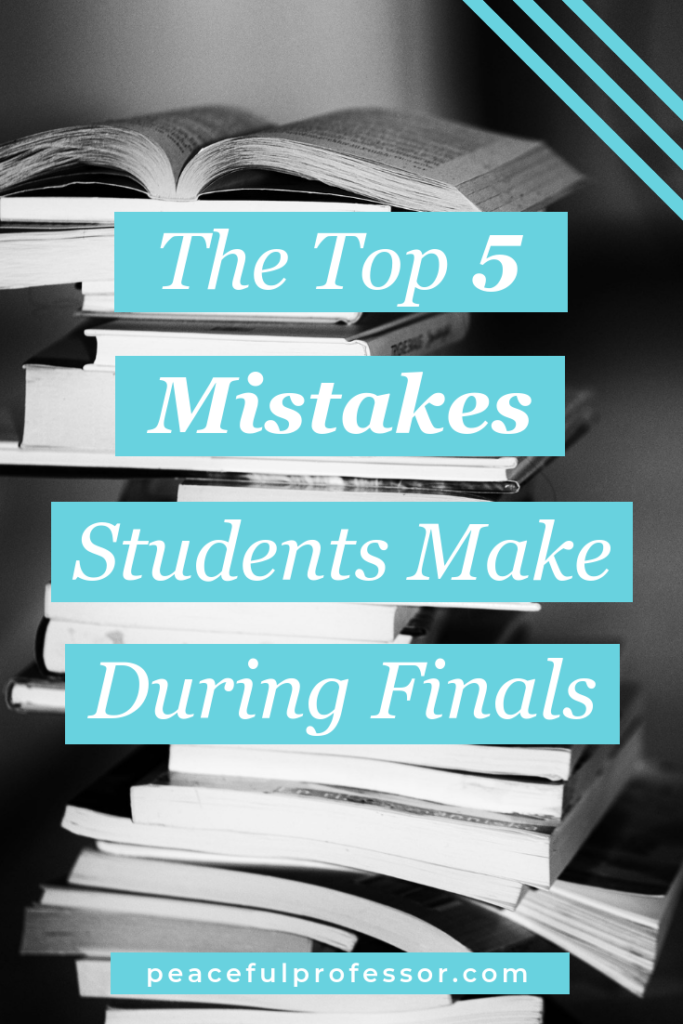5 Ways to Support Your College Student During Final Exams
The end of the semester can be a very challenging time for your college student. They’re already exhausted from a busy term but still have to push through projects and final exams. Although it can be difficult to offer support when your student is far from home, here are five ways you can help them manage final exam stress and finish the semester strong.
Encourage stress management
Many college classes have the bulk of their high-value assignments at the end of the term and final exams tend to be weighted heavily. This puts a lot of pressure on students to perform well. Combine that pressure with ineffective stress management, and you have a recipe for burnout.
Remind your student that studying effectively and efficiently requires them to take care of their mental and physical health. This means making a plan in advance, which includes not just what they need to study but also the breaks they will take and the self-care activities they’ll participate in to relieve stress.
To make their plan, encourage your student to review syllabi, class notes, and the university exam schedule, then work backwards to determine how much time they’ll need to devote to each course. They should add these time slots to their planners as well as regular breaks in between. It’s also a good idea to schedule appointments with professors and tutors before finals week since that’s a busy time for everyone on campus.
Also, encourage your student to continue doing activities they enjoy and to not isolate themselves in their dorm room or apartment. Getting outside and among their friends are important stress relievers.
Remind your student of campus resources
Colleges and universities offer students a huge array of services and resources. Unfortunately, many students are unaware of everything their school offers (or, they know about them but don’t take advantage). Make sure you’re aware of the campus offices that are dedicated to student success, which will be listed on you student’s college website. These offices and centers include resources such as academic tutoring, study skill development, recreation, and mental health counseling.
Most colleges and universities also host numerous events during final exam week to help students de-stress, which often include free food and fun activities. It’s also common for professors to offer exam review sessions, study guides, and extra office hours. And please don’t forget about the campus counseling center! They often increase their hours during exam week and offer services like peer counseling and support via text messaging.
So when your student complains about how stressed and overwhelmed they are, encourage them to take advantage of these resources. After all, their tuition helps pay for them!
Emphasize the importance of sleep
Many people think all-nighters are a collegiate rite of passage. What they really are is a recipe for ill health. According to the American Academy of Sleep Medicine, studies of college students have found that lack of sleep, erratic sleep/wake schedules, and poor sleep quality have a negative impact on academic performance and overall mental health.
More specifically, a growing body of research in neuroscience is demonstrating how important sleep is to learning and memory. It’s during sleep that our brains organize and prioritize information learned during the day. According to Dr. Matthew Walker, a sleep researcher at the University of California, Berkeley, sleep after learning is essential to save new information into the architecture of the brain. Without sleep, our ability to learn new information can drop by up to 40 percent! So remind your student that staying awake all night to study is actually doing them more harm than good.

Listen more, talk less
When your student calls, upset and overwhelmed, you may feel the urge to swoop in and fix what’s ailing them. Although being supportive is essential, you want to empower them, not enable them. During these conversations, it’s best to let your student do most of the talking. Let them vent then ask questions rather than telling them what to do. For example, ask: “what are you going to do about this situation?” Encourage them to formulate a plan with specific steps to solve their own problems.
It’s also important to ask your student what they need from you rather than assuming you know what would help them. Perhaps they want a care package with comforting reminders of home, a sounding board for their ideas, or simply someone to listen to them. You won’t know what they need unless you ask!
Another way to offer support is to send your student encouraging messages, such as texts or emails. This lets them know you’re thinking about them without being too intrusive. If your student doesn’t have time to talk on the phone, or doesn’t respond right away to a text, don’t get upset. Remember that they are busy and give them space.
Be mindful of your student’s mental health
Sometimes parents don’t realize just how much pressure students feel to perform well in school. Many students report that a lot of their stress comes from not wanting to disappoint their families. Make sure your student knows that their health and happiness are far more important to you than the grades they earn on their exams.
For some students, the pressure of final exams can become overwhelming and contribute to the development or exacerbation of mental health conditions like depression and anxiety. Thus, it’s critical to be mindful of your student’s mental health.
Mood swings are not unusual during exams, but if your student has exhibited any of the following signs, it’s time to get more involved and have your student make an appointment with the campus counseling center:
- Persistent feelings of sadness, hopelessness, and worthlessness
- Angry outbursts, irritability or frustration, even over small matters
- Unexplained physical problems, such as back pain or headaches
- Loss of interest in most or all day-to-day activities, including a loss of pleasure in activities they once enjoyed.
- Unusual sleep disturbances, including insomnia or sleeping too much
- Extreme changes in appetite
- Slowed speaking or body movements
- Trouble concentrating, making decisions, and remembering things
- Frequent or recurrent thoughts of death, suicidal thoughts, and suicide attempts
Thinking about these things can be scary, but it’s important for parents to pay close attention to their student’s behavior in order to notice these warning signs. Getting your student help early can prevent conditions from worsening.
If you suspect that your student may be struggling with their mental health, ask them directly how they are currently feeling and encourage them to make an appointment with the campus counseling center. If you’re alarmed by changes in your student’s behavior, you can also communicate directly with the college’s counseling office or student affairs office.
Final exam week is a very challenging time for students, both emotionally and intellectually. Having a support network and an understanding of stress management strategies are essential to effectively managing this hectic time. Ultimately, your student’s success is up to them, but employing these five strategies will help you support your student no matter how far away they are.
Looking for advice to share with your college student about how to perform well on their final exams while maintaining their sanity? Send them the link to this blog post: The Top Five Mistakes College Students Make During Finals Week

